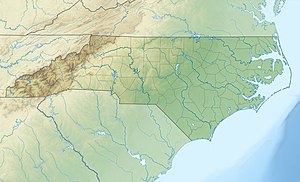Beaverdam Creek (Lanes Creek tributary)
Appearance
| Beaverdam Creek Tributary to Lanes Creek | |
|---|---|
| Location | |
| Country | United States |
| State | North Carolina |
| County | Union |
| Physical characteristics | |
| Source | Rays Fork divide |
| • location | about 3 miles south of Wingate, North Carolina |
| • coordinates | 34°55′25″N 080°26′41″W / 34.92361°N 80.44472°W[1] |
| • elevation | 612 ft (187 m)[2] |
| Mouth | Lanes Creek |
• location | about 2.5 miles southeast of Marshville, North Carolina |
• coordinates | 34°57′53″N 080°18′34″W / 34.96472°N 80.30944°W[1] |
• elevation | 398 ft (121 m)[2] |
| Length | 11.96 mi (19.25 km)[3] |
| Basin size | 18.34 square miles (47.5 km2)[4] |
| Discharge | |
| • location | Lanes Creek |
| • average | 21.21 cu ft/s (0.601 m3/s) at mouth with Lanes Creek[4] |
| Basin features | |
| Progression | Lanes Creek → Rocky River → Pee Dee River → Winyah Bay → Atlantic Ocean |
| River system | Pee Dee River |
| Tributaries | |
| • left | Reedy Branch Maple Springs Branch |
| • right | Haney Branch |
| Bridges | White Store Road, Snyder Store Road, Russell Pope Road, Camden Road, Gilboa Road, Old Pagelane-Marshville Road, Blair Road, Landsford Road |
Beaverdam Creek is a 11.96 mi (19.25 km) long 3rd order tributary to Lanes Creek in Union County, North Carolina.
Course
[edit]Beaverdam Creek rises in a pond about 3 miles south of Wingate, North Carolina. Beaverdam Creek then flows northeast to meet Lanes Creek about 2.5 miles southeast of Marshville.[2]
Watershed
[edit]Beaverdam Creek drains 18.34 square miles (47.5 km2) of area, receives about 48.3 in/year of precipitation, has a topographic wetness index of 439.41 and is about 37% forested.[4]
References
[edit]- ^ a b "GNIS Detail - Beaverdam Creek". geonames.usgs.gov. US Geological Survey. Retrieved 24 October 2020.
- ^ a b c "Beaverdam Creek Topo Map in Union". TopoZone. Locality, LLC. Retrieved 24 October 2020.
- ^ "ArcGIS Web Application". epa.maps.arcgis.com. US EPA. Retrieved 24 October 2020.
- ^ a b c "Beaverdam Creek Watershed Report". US EPA Geoviewer. US EPA. Retrieved 24 October 2020.


